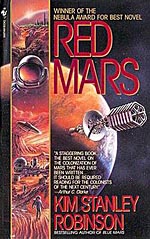
![]() charlesdee
charlesdee
7/31/2011
![]()
The last long science fiction I read was Dune the year it came out. Then a long period of no science fiction, and in the past year a return to the genre. And one thing I have liked about the mid-century sf I have been reading is its low page count. Most of these guys, and so far I have read only guys, get the story done in under 300 pages. And I really go for the ones that clock in at around 180. There's a good idea, the story moves fast, outrageous things can happen but the story can also be quite moving.
Red Mars is 572 pages long, and it is only part one of a trilogy. (SF writers used to crank out short stories because they only got around a penny a word. Nowadays it seems that long novels in series is the way to go.) But by all reports, Red Mars, and the subsequent Green Mars and Blue Mars are good solid entertainment and a relatively realistic look at how human colonization of Mars might play out. On the cover of the copy I had, Arthur C. Clarke hailed it as "The best novel on the colonization of Mars that has every been written." I don't know how big or how seriously competitive that field is, but I can say that is the best novel on the colonization of Mars that I have ever read.
With 600 pages of narrative you expect some character development, a sense of history, and a good plot. Robinson creates good characters. When we fist meet them they seem destined to fill stereotyped slots in an sf novel of this kind: The ex-Astronaut who was the first man to land on Mars; the gregarious Russian who spouts revolution; the female scientist who believes Mars should remain essentially untouched played against the male scientist fixated on terraforming the planet; the diplomat; and, the difficult, Russian beauty who will allow for a certain amount of erotic tension, but not too much. But the story, told in long sections that focus on individual characters, is never formulaic. The novel follows competent people working hard in an alien environment where where everything around them is deadly.
One hundred of them set off for Mars, and the book covers about thirty years. And yes, at times I felt like I was plodding through a James Michener novel about Hawaii or Texas or The Holy Land. (That feeling could return if I read the next two in the series.) Critics praise Robinson for writing hard sf, science fiction where the writer uses a serious scientific background to develop the plot. Most of that is lost on me -- I never did understand the whole space elevator thing -- but I did enjoy the way the colonization developed from 100 dedicated scientists to tens of thousands of new immigrants, sent either by the homelands to secure a spot on the new planet, or the equivalent of wildcatters out to exploit the treasure trove of metals the planet holds.
There is a mystery, actually several mysteries, involved, and the political maneuvering that becomes part of the expanding society rings true to what one would expect in a world that is part research station, part boomtown, and part escape valve for an earth that is going out of control. I have to say, though, that one description of a Martian sunset is very much like another, and that we have better get busy with advancing robotic technology to get these guys settled on Mars by 2026.
James Cameron has Robinson's trilogy under option, which seems as inevitable as the fact that nothing will probably ever come it. It could be the next Battlestar Galactica, and I don't mean this as a spoiler, but,if they do the trilogy, a lot of actors are going to have only one year contracts.
http://www.potatoweather.blogspot.com